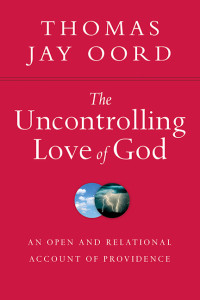Making Sense of God and Evil
We all want to make sense of life. But tragedies and evils – whether caused by free creatures, microorganisms, or random events – make it difficult to do so.
Unconvincing Answers to Questions about Evil
The answers most people give to God’s role in evil are unconvincing.
Many people say God is in control or at least could be. But a God who controls or could do so should, in the name of love, prevent genuine evil. A God capable of control is culpable for failing to prevent evil.
Others portray God as unaffected, aloof, and uninvolved. This God has a “hands-off” policy toward creation. But this view makes it difficult to believe that God is doing anything in life, other than making existence possible. This God is an absentee landlord.
Most often, believers in God appeal to mystery in the face of evil. “God’s ways are not our ways,” they say. Those who appeal to mystery in this way are typically unwilling to rethink their view of God. Consequently, they cannot make sense of life.
The Uncontrolling God Solution
Since my book, The Uncontrolling Love of God, appeared in print last November, a growing number of people have become aware of my solution to the problem of evil. Many find it quite helpful. Of course, not everyone is convinced. But there is a growing number of people willing to rethinking the view of God’s power they’ve been taught or simply assumed.
The basic intuition at the heart of my solution is that love is inherently uncontrolling. Love does not coerce.
I develop this intuition in my book in a way I have not found in any other book. I argue that self-giving, others-empowering love is the logically preeminent attribute of God’s nature. This means that self-giving, others-empowering love comes before God’s sovereign choice. As a consequence, God must love and cannot control others.
A growing number of people are rethinking the view of God's power they've been taught or assumed. Share on XEssential Kenosis
My solution to the problem of evil is part of a model of providence I call essential kenosis. When describing this model, I draw from the general themes of Christian scripture, especially those pertaining to divine love, creaturely agency, and God-creation relationship. I also draw from resources in philosophy, science, and everyday experiences.
The central feature of essential kenosis is that God cannot deny God’s own nature of self-giving love. God’s gives freedom, agency, self-organization, or spontaneity to creatures. Because the divine nature is self-giving love and because God “cannot deny himself” (2 Tim. 2:13), God cannot withhold, override, or fail to provide these gifts to creation. God’s gifts are irrevocable (Rom. 11:29).
Because God cannot control others, God is not culpable for failing to prevent evil.
The God that essential kenosis describes has plans and purposes. God invites, commands, and empowers creatures to respond without controlling them. God does not operate from a foreordained or foreknown detailed blueprint. Instead, God empowers and enables others, and creatures who cooperate can work with God toward good purposes.
God does not operate from a foreordained or foreknown detailed blueprint. Share on XAn Adventure Model of Providence
Essential kenosis offers an adventure model of providence. Adventures aren’t safe; they have general goals not predetermined designs. Adventures involve calculated risks, free decisions, and sometimes random occurrences. Adventures have no blueprints.
I believe the adventure model makes better sense of God and life than alternative models of providence. After all, our world has both genuine good and evil, both randomness and regularity. Life also has freedom, agency, disappointments, and even miracles.
The adventure model also fits a vision of a God who does not and cannot control others entirely. A God of love is uncontrolling, because love is an adventure without guaranteed results.
A God of love is uncontrolling, because love is an adventure without guaranteed results. Share on XBecome Part of the Uncontrolling Love Conversation
If this vision intrigues you, you may want to join a Facebook discussion group exploring the book. Simply type “The Uncontrolling Love of God book discussion” in Facebook’s search engine. Craig Drurey administers the group.
Those of you in Southern California are invited to public lectures I’m giving at various sites the first few weeks of March. Find details of the various lectures on the Projects and Lectures tab at the top of my webpage.
Or you may want to read the book and post a review. There are 40 reviews posted on Amazon right now, and more reviews are forthcoming in journals, on blogsites, and elsewhere.
I end The Uncontrolling Love of God with these words, “God’s uncontrolling providence is an adventure of open and relational love.” I pray that you find helpful this way of thinking about God and making sense of life!
Become part of The Uncontrolling Love of God book conversation... Share on X
Comments
I just wanted to say thanks for writing this book. I heard your interview on Homebrewed and ordered the book. It is one of those rare books that keeps rattling around in my brain after I’ve finished reading it. I posted my thoughts on my blog today.
Thanks so much, Stephen! I’ll take a look at your review and spread it.